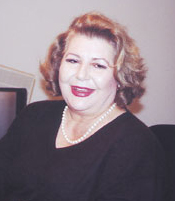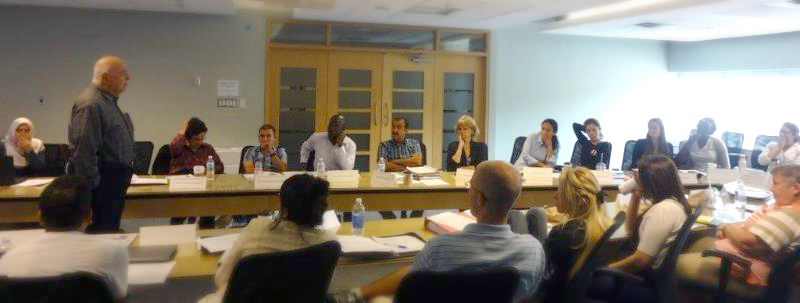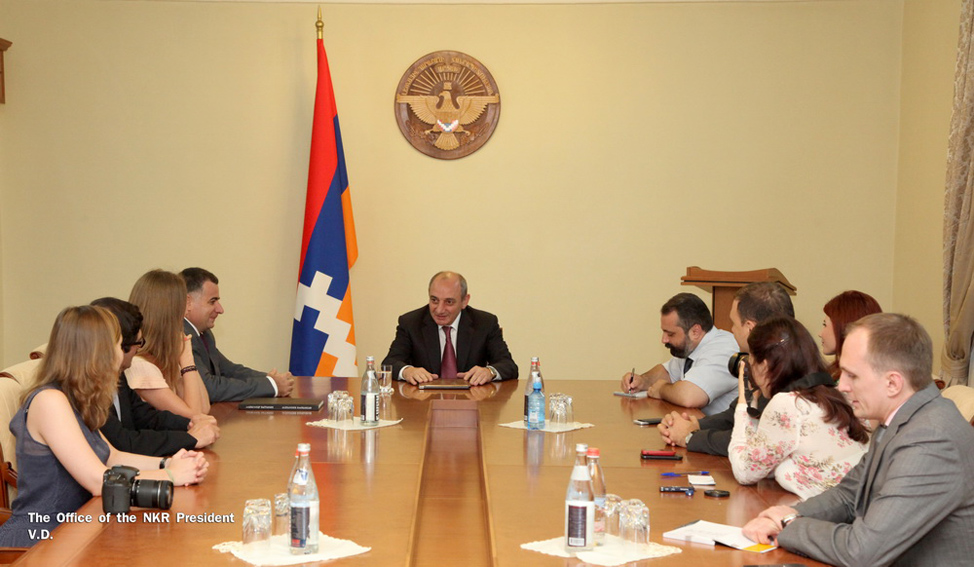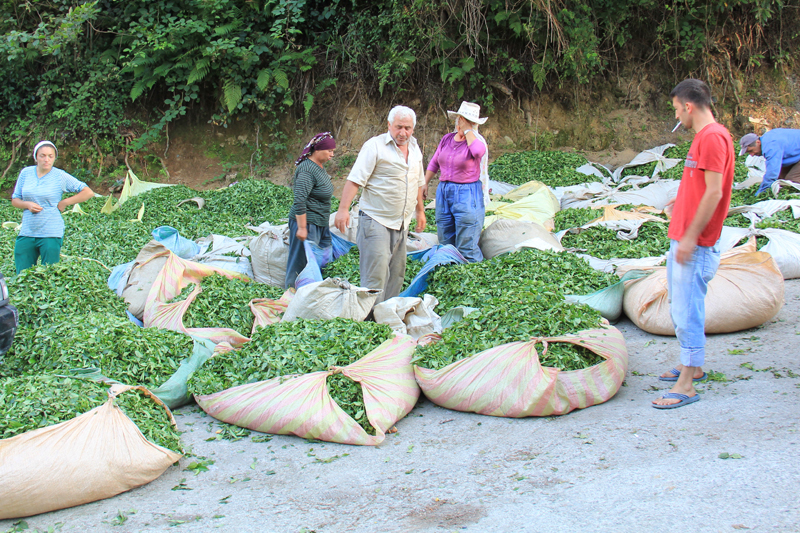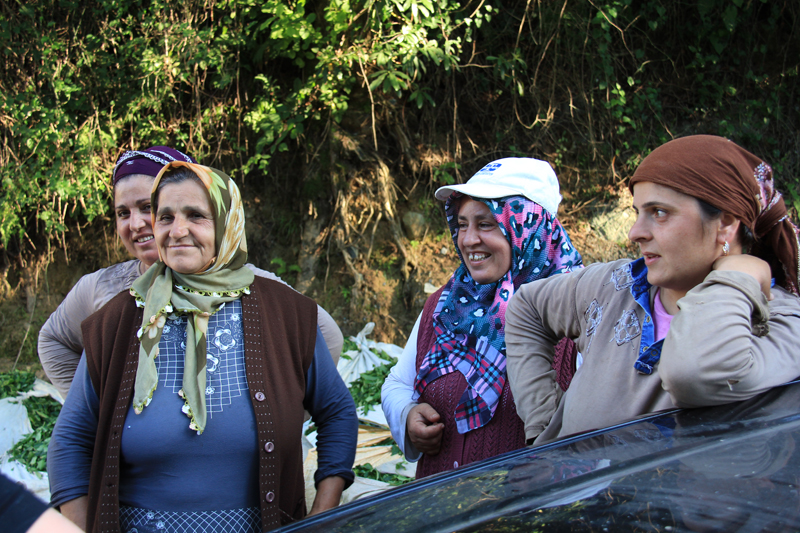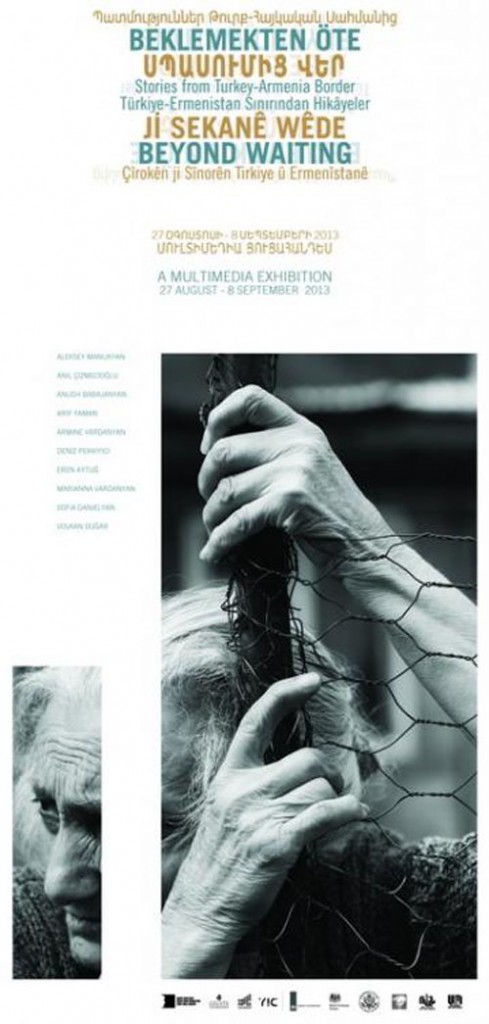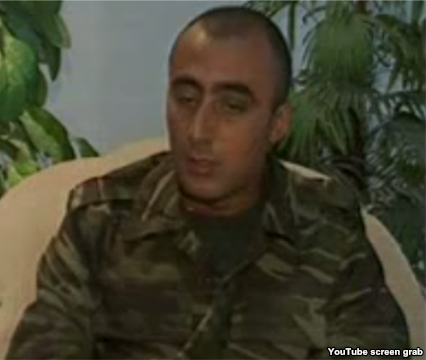By Lucine Kasbarian
Sexual slavery, forced labor and the extraction of body organs: These are the most common reasons for human trafficking, which represents an estimated $32 billion per year in international trade.
In 2008, the United Nations estimated that nearly 2.5 million people from more than 125 different countries were being trafficked into some 135 countries around the world.
According to the International Organization for Migration, sex trafficking means coercing a migrant into a sexual act as a condition of allowing or arranging the migration. Sex trafficking uses physical or sexual coercion, deception, abuse of power and bondage incurred through forced debt. Trafficked women and children, for instance, are often promised work in the domestic or service industry but, instead, are sometimes taken to brothels where they are forced into prostitution, and their passports and other identification papers are confiscated. They may be beaten or locked up and promised their freedom only after earning – through prostitution – their purchase price and their travel and visa costs.
Vulnerable populations in former Soviet states, such as Armenia, are particularly susceptible to this global phenomenon. Since Armenia’s independence, thousands of Armenian women and girls have been taken — to Russia, Turkey, and some Arab states of the Persian Gulf — to be initiated into prostitution.
A 2003-2004 investigation by Edik Baghdasaryan and Ara Manoogian, journalists for HETQ.am and TheTruthMustBeTold.com, concluded that approximately 2,000 Armenian women were involved in the sex trade in the United Arab Emirates, Bahrain and Oman. Their findings were documented in the film and book, “Desert Nights.â€
Earlier this year, Armenian-American author Vahan Zanoyan released “A Place Far Away†(Create Space Books, $16.95), a crime novel about sex trafficking in Armenia. While the storyline reads like a sordid suspense saga, the situations are largely based on actual events, the result of on-the-ground research by the author.
In Zanoyan’s engrossing tale, the action shifts between the trafficked Lara Galian and Swiss-Armenian investigative journalist Edik Laurian’s attempts to uncover what happened to her and her relatives.
Sixteen year-old Lara lives with her family in the poor village of Saralanj, located somewhere in Armenia. Unaware of her striking good looks, Lara becomes the unsuspecting target of a local crime boss, Sergei Ayvazian, who wishes to exploit her beauty. After Lara’s skeptical father Samvel rejects Ayvazian’s offer to manage a lucrative modeling career for Lara, Samvel is found dead in a ravine. Grieving, sick and penniless, Lara’s mother reluctantly agrees to Ayvazian’s proposal, and allows Lara to travel abroad. Once in Ayvazian’s custody, Lara is beaten, raped and discovers the true nature of the work that awaits her. Shuttled from Moscow to Dubai, Lara is eventually sold, in a one-year contract, to a local sheik. While Lara unwillingly goes along with her handlers, she nevertheless tries to maintain her sanity and plot an escape. At the same time, journalist Edik Laurian discovers and investigates Lara’s case in Armenia. As the action unfolds, Edik, Lara, her family and a cast of dubious characters struggle to dictate Lara’s destiny, in the lead-up to the thrilling finale.
The following interview with Vahan Zanoyan took place in Yerevan on June 20, 2013:
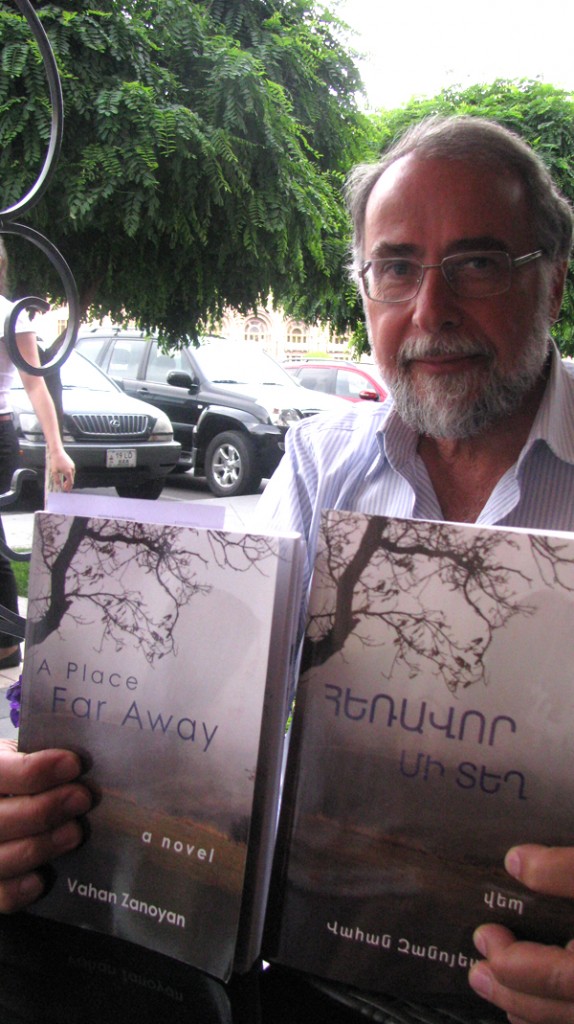 Lucine Kasbarian: How did you decide to write this book?
Lucine Kasbarian: How did you decide to write this book?
Vahan Zanoyan: I discovered the Armenian sex trafficking phenomenon by accident. While on a business trip to Dubai, I ran into a beautiful 17 year-old Armenian girl. The girl was talking with another woman, and I could tell the conversation was strained. It’s a long tale, but it took six months to extract her story from her because the girl was very scared. I compensated her for her time so that her pimps would not get suspicious. Finally, she started to trust me and tell me what happened to her. I spent close to two years researching the issue. To be clear, Lara Galian is a composite sketch of four Armenian girls I met in Dubai. All the names and locations in the book have been changed to protect the innocent.
Lucine Kasbarian: What has the reaction been to “A Place Far Away?â€
Vahan Zanoyan: The book has received very favorable responses and reviews from media and readers. I don’t seek to make a profit from this initiative. My aim is to raise awareness, assist the victims and work on prevention.
All proceeds from the book go to the United Methodist Center on Relief (http://www.UMCOR.org ), a nonprofit organization that helps integrate and rehabilitate freed victims of sex trafficking, and that has a significant presence in Armenia; and Orran (http://www.ORRAN.am), a charitable organization that provides a safe haven to the most vulnerable in Armenian society – such as homeless youth forced to live on the streets. They are the first to be picked off by traffickers.
Orran does preventive work, while UMCOR has shelters where they help rehabilitate rescued victims. Rescuing the victims can be especially challenging work since some pimps stage fake rescue attempts to fool the girls. The pimps then lock them up, beat them and thus deter them from considering genuine rescue attempts in the future. But there are not enough resources or money to do everything that needs to be done.
LK: In June, your book was translated into the Armenian language. Tell us about that.
VZ: To help launch this new edition in Armenia, I appeared on perhaps every major talk show on Armenian television. A reception was held at U.S. Ambassador Heffern’s home in Yerevan, which was attended by around one hundred people, including journalists and organizations engaged in the struggle against human trafficking.
Unfortunately, today’s Armenia is divided into the filthy rich who don’t read, and the penniless class who love to read but can’t afford to buy books. Thus, nowadays, Armenia does not boast a widespread reading public as it once used to. That said, trafficking of Armenian women is a hot topic in certain circles right now. My book costs 3,000 Dram [about $7.50 USD], which most native Armenians cannot afford. So I’m not sure how well the book is selling in Armenia, even though it did make it to the top of a bestseller list compiled by ArmenPress.
LK: What did you want to accomplish by writing this book?
VZ: I wanted to use gripping suspense to expose one of the most significant issues of our time. I also wanted to help create awareness about the criminal class in Armenia. If we sugarcoat that aspect of life because of national pride, we are doing our country and people a great disservice. Aside from telling the main story, I also wanted to showcase the Armenian people, our history, our culture and our moral courage. For example, I wrote about the beauty of Armenia’s landscape as a way to remind people of our nation’s gifts, our undeniable assets and to inspire the people who, more than ever, need a moral uplift.
LK: What message would you like to send to the young, poor or disadvantaged women of Armenia?
VZ: Don’t fall for promises that sound too good to be true or appeal to your vanity. When you face poverty, there are other alternatives. A 16 year-old will trust her own circle of friends or relatives, many of whom might sell her off. This could include former childhood classmates who have fallen in with a bad crowd, brothers who have drug addictions to feed, or uncles who have gambling debts to pay. They don’t think twice about bartering a friend or relative to feed their habits.
LK: Do some of the girls escape and return home? Why do some stay even after they have “paid their debts?â€
VZ: For the vast majority of them, escape seems impossible. For many, there are moral issues that can’t be overcome. How can a girl resume a respectable life in Armenia if she has been dishonored through prostitution? These thugs rule by fear. The traffickers, pimps and madams are all Armenian. They pay off the police, too.
LK: What do you say to those Armenians who don’t want to call attention to this trend because of how shameful it is?
VZ: We can’t say amot eh [it’s shameful], get embarrassed, and stay quiet. Our silence makes us participants in this crime. The best thing for traffickers is this kind of radio silence on their activities. By exposing them, we help the victims. If I had the means, I’d freely distribute the book to every Armenian over 18, both inside and outside Armenia. Speaking out could also make public officials more diligent. After the “Desert Nights†documentary surfaced, Armenian authorities began to take notice and action. Before this, the officials would consider the casualties to be complicit in the crimes rather than victims of crime.
LK: What would you like to see happen regarding human trafficking?
VZ: There are many great organizations that fight against the symptoms of trafficking. One is House of Hope (http://mer-hooys.org/). It provides teenage girls from state-run orphanages with a safe home, a family environment, and psychological support, as well as life and job-training skills. While such organizations do valuable work, they treat the symptoms affecting these girls but not the root causes, which are the pathetic economic and social conditions in Armenia.
Seventy years of Soviet rule, broken homes, fathers who have left their families to work abroad and did not come back — all these have contributed to the decay of our collective moral fiber. In 1915, Armenian women threw themselves into the Euphrates River to die rather than be raped by Turks. Now, underprivileged Armenian women and families are turning to prostitution as a survival option.
Some improvements are happening, and I’d like to see this continue. The police in Armenia are more cooperative on this issue. We need more people working with victims, prevention organizations, law enforcement, and victim rehabilitation and reintegration programs. There is a new flow of victims every day, so we must stop it at the source while taking care of the existing victims. But as I said earlier, the root cause is the horrible economic and social conditions in the country. Unless that problem is addressed, this phenomenon will only get worse.
LK: In writing this novel, you also managed to incorporate personal views and a Diasporan’s desire to be understood by native Armenians. For example, the character of Edik writes verse as he marvels at the Armenian landscape. One reviewer said the descriptions were so compelling it could bolster tourism to Armenia. The same Edik ruminates about Armenian ancestral moral codes, saying, “The ultimate human dignity was living within one’s means.†Your family’s repatriation experience is represented, too, as the Galians were aghbars, a pejorative term for “brother†that was and still is assigned to some repatriates. Would you talk about this?
VZ: As you rightly say, the book is about more than the story of one victim of trafficking. In a novel like this, I felt obliged to also describe the country, both in its beauty, history, and in the goodness of the common man, as well as in its deep-rooted problems, such as the rule of the ruthless oligarchs, and the corruption, and fear that they spread. The dynamic between the local Armenians and the Diaspora Armenians is part of the post-independence Armenian reality, and could not have been excluded from the narrative. The contrast between how Diasporan Armenians generally react to situations toward which local Armenians are largely indifferent has always intrigued me, and I wanted to incorporate that aspect in the novel.
LK: The character of Edik also talks about how in post-Soviet Armenia, authority figures could not be challenged without serious and often fatal consequences, and how the “Western, activist approach has no place in this psyche.†Please talk about this concept.
VZ: One of the foundations of communist philosophy and the Soviet system that ruled Armenia was the alleged precedence of the public and collective good over individual rights. Individualism, which was the important driving force of Western civilizations and philosophy, had no place on the Soviet system. To this day I see this in Armenia when, for example, I was following peoples’ attitude toward Raffi Hovanissian’s way of presidential campaigning. Everyone knows the current leadership is bad, but no one believes it can be changed. Can you imagine that attitude in the U.S. or Western Europe? A handful of oligarchs, no matter how elaborate their system of patronage and bureaucratic loyalty, would not be able to rule a country when everyone knows and sees what they are doing. And yet, they get away with it in Armenia because people have been conditioned — under seventy years of Soviet rule — to accept authority, not to challenge. Only when that link in this vicious cycle is broken will Armenia start the process of healing.
LK: In the narrative, you present an act of retribution that comes about after authorities do nothing to apprehend and punish criminals. Do you think there is a place for vigilantism in today’s Armenia?
VZ: Vigilantism is a dangerous thing to advocate, and that is not what I am advocating. It is dangerous simply because it can easily lead to new gangs, gang wars, and more destruction. So popular or widespread vigilantism is not the answer. But there have been critical moments in history when the situation gets so desperate that acts of “Divine Retribution†save the day. I think one celebrated case like that goes a long way in shaking things up and waking dulled consciences, not to mention giving people some hope.
LK: What’s next?
VZ: I plan to return to Dubai to do additional research for a sequel book and follow up on the whereabouts of the unfortunate girls I’d met.
LK: How can readers help?
VZ: They can help raise public awareness by circulating the documentary film, “Desert Nightsâ€: http://www.youtube.com/playlist?list=PL582F8F6B42B3277A
They can circulate this interview.
They can devise a way to send a copy of this book to every member of the U.S. Congress.
They can buy print or electronic copies of “A Place Far Away†for colleagues, friends and decision makers. https://www.createspace.com/4061270.
In September, I’ll be touring the Eastern United States and Canada to promote the book. I will be delivering presentations at Sts. Vartanantz Church in Ridgefield, N.J. on Sep 22 and the Armenian Diocese in NYC on Sept 26. Details are available on the books’ Facebook page: https://www.facebook.com/APlaceFarAway
LK: Why did you choose self-publishing?
VZ: I tried to go the established route, but found it to be one of the most exasperating experiences of my life. The prevailing practice in the industry is to require authors to submit a one-page pitch letter to agents for representation consideration. I resented trying to encapsulate the thrust of what became “A Place Far Away†into a one-page synopsis, but nevertheless approached a total of 22 agents — all to no avail. Since I didn’t care about the perceived prestige that comes with being affiliated with a traditional publisher, I decided to produce the book on my own to maintain editorial control. I have no regrets.
Women Exploited: Author Zanoyan Spotlights Sex Trafficking in Armenia
